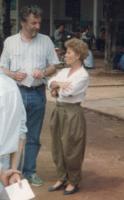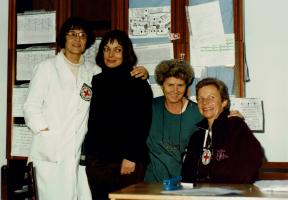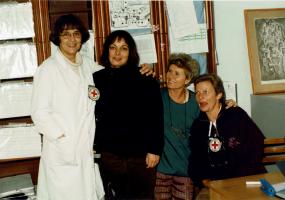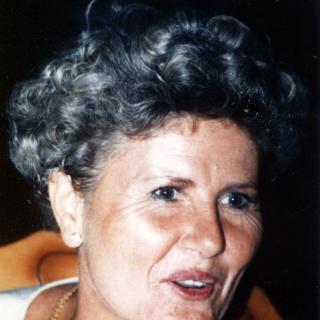Fernanda Calado was born on 28 October 1947 in Seville, Spain. Together with her family, she moved to La Chaux-de-Fonds, Switzerland, in 1962. She was drawn to nursing, and began training as a nurse’s assistant. She went on to earn her nurse’s diploma in Lausanne in 1978. Fernanda further honed her skills through additional nurse’s training in surgical and intensive care through the early 1980s.
At the start of her career, Fernanda worked and trained in various medical settings in Geneva. Curious about other cultures and ways of life, she also seized opportunities to travel and work in different parts of the world. She gained initial experience in the humanitarian sphere through two short assignments with the Swiss Humanitarian Aid Unit (SHA), in Somalia (1981) and Equatorial Guinea (1983). She joined the ICRC in January 1985.
Fernanda’s first four assignments with the ICRC took her to Angola, South Africa, Mozambique and Israel and the occupied territories, as either a health delegate or surgical ward nurse. In the former role, her tasks included assessing the needs of people living in conflict zones, taking part in medical visits, helping to manage nutritional rehabilitation centres and getting involved in public-health issues. Next came two successive assignments to Pakistan, where, as surgical ward nurse and then head nurse, she oversaw post-operative care, trained paramedical staff and helped run the radiography and outpatient units. Subsequently, in Cambodia, Fernanda served as head nurse in charge of medical and surgical care and oversaw a team of expatriate nurses.
After several long assignments, Fernanda stepped back from the ICRC in mid-1994, withdrawing to Seville for a few months. She then returned to the ICRC for some shorter assignments. These were to Kenya, Somalia, Ecuador and Rwanda – where she served as health delegate – and Sudan, where she focused on training hospital staff.
In October 1996, Fernanda started what would be her final assignment, in Chechnya. She was based in the village of Novye Atagi, some 20 kilometres south-west of the capital Grozny, where the ICRC had opened a field hospital. In the early hours of 17 December 1996, six delegates, including 49-year-old Fernanda, were shot dead by masked gunmen in their rooms in the ICRC residence next to the field hospital. Like Fernanda, four other murdered delegates had been seconded to the ICRC by National Red Cross Societies: Ingebørg Foss, 42, and Gunnhild Myklebust, 50, both nurses with the Norwegian Red Cross; Hans Elkerbout, 47, a construction manager with the Netherlands Red Cross; and Sheryl Thayer, 40, a nurse with the New Zealand Red Cross. The sixth delegate was medical administrator Nancy Malloy, 51, from Canada, who had worked for several years with the ICRC. Another delegate, Christophe Hensch, a Swiss national in charge of the ICRC's Novye Atagi office, was shot and survived.
Jean de Courten, the ICRC’s director of operations, called the attack a cowardly, “deliberate assassination”. Following the tragedy, the ICRC evacuated its remaining 14 delegates from Novye Atagi. Local medical staff continued to care for patients at the hospital. Speaking at a memorial ceremony at Saint-Pierre Cathedral, Geneva, just days after the attack, ICRC President Cornelio Sommaruga said: “All six were dedicated to the ideal of solidarity with the victims of the Chechen conflict. They were fulfilling with exemplary enthusiasm the original mission of the Red Cross – to care for wounded – and they were doing it in the same spirit as the women of Solferino: ‘Tutti fratelli’ [We are all brothers].”
Fernanda’s slight physical stature belied an imposing presence. She could tactfully solve problems in complex circumstances while energetically attending to everyone around her – patients, expatriate colleagues and local staff. This combination of passion and composure was reminiscent of tango, the dance that she loved.



